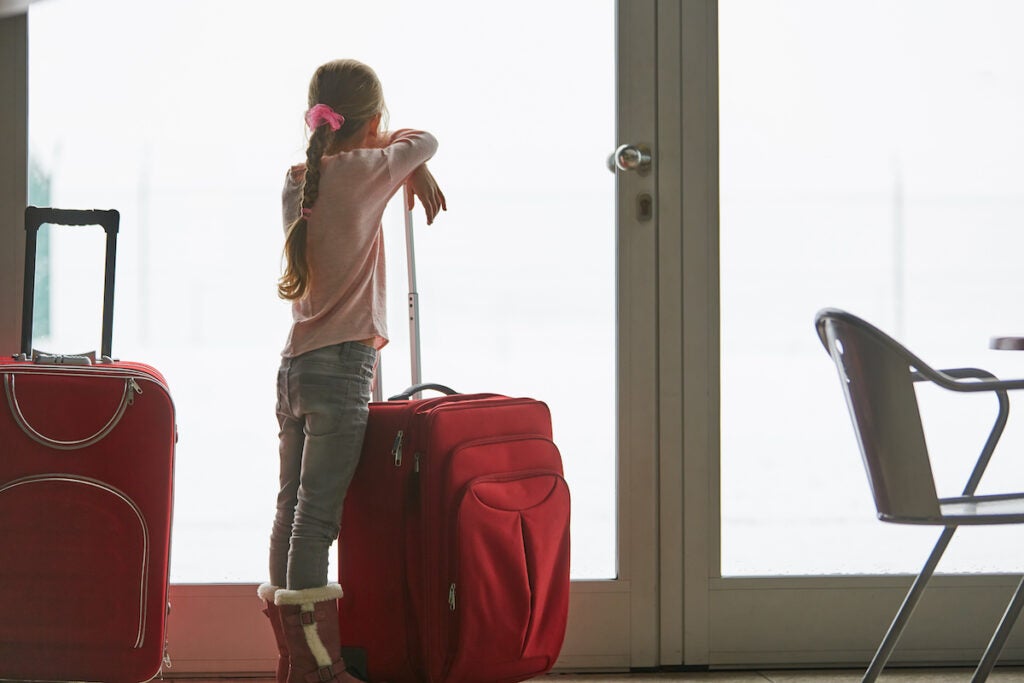
After months of rumour and speculation about their relationship, American singer Joe Jonas and British Game of Thrones star Sophie Turner have confirmed their marriage is over.
In a joint statement on Instagram, the couple – who have two young children – said that they ‘have mutually agreed to amicably end’ their four-year marriage, a day after Mr Jonas filed for divorce in Miami Dade County, Florida, stating the marriage was ‘irretrievably broken’.
[See also: Resolution is failing to inspire respect, say critics]
Like many international marriages, one half of the couple was living in their home country while the other was living in what is to them a foreign country, away from their extended family and long-standing friendships. In an interview last year, Ms Turner admitted she was homesick for the United Kingdom and wanted to move back for the sake of her mental health, but that her husband was reluctant to leave the United States.
Can I take my child to live abroad?
When an international couple separates and there are children involved, it is not as easy as one of them packing up and going back to live in their home country. That is because in many countries, including England, the returning parent needs the other parent’s permission to take the children with them or, if no permission is given, a court order granting permission.
Reports suggest Mr Jonas is asking the court in Florida to order shared care of their children. The law in Florida on granting permission to take the children to live abroad will be different to the law in England but if the parties share the care of the children and Mr Jonas does not agree that Ms Turner can take them to live in the UK, it will be difficult for the actress to get the court’s permission if that is what she wants.
[See also: UAE family law is changing the game for British expats]
If the situation were reversed and the family lived in England, with Mr Jonas making such an application (a ‘leave to remove’ application) to take the children to live in the United States against Ms Turner’s wishes, the English court would consider what is in the children’s best interests.

What might shared care arrangements look like?
Of significant importance is the impact on the children’s relationship with the ‘left behind’ parent. If there is a shared care arrangement (and shared care does not have to mean an exact 50/50 division of the children’s time between their parents), then that relationship will be profoundly affected.
[See also: How to make divorce look good]
However, a shared care arrangement does not present an absolute bar to obtaining the court’s permission to take the children to live abroad, if the court is satisfied that good contact arrangements will be put in place after the children’s departure.
That might involve the children returning to England for half or more of the school holidays (depending on how far away they are living) and the non-resident parent having the right to spend time with the children in their new country whenever he/she is able to.
FaceTime contact is an important element of the ongoing parent/child relationship, although clearly this cannot compensate for the loss of regular in-person contact.
How would a court in England decide?
A distinct primary carer who applies to take their children abroad will not automatically secure the permission of the English court.
Again, the court will consider what is in the children’s best interests and the impact on their relationship with the non-primary carer, the ‘left behind’ parent.

The court will also consider the children’s ages, their wishes and feelings (which are given more weight the older the children are), the applicant parent’s plan for the children’s education and accommodation in the new country, extended family relationships and, although not determinative, the likely impact of the court’s refusal to grant permission on the parent wanting to “move home”.
Here, the court will consider the effect on the children of the applicant’s mental health, were he/she effectively forced to remain living in a foreign country after divorce.
The particular family circumstances need to be examined: there is no guarantee that this will convince a court to grant permission, rather, it has to be weighed up against all the other factors in deciding what is in the children’s best interests.
[See also: Charles Russell: Divorced parents need better rights to see children]
What happens if a court grants permission for a child to live abroad?
If the court grants permission for the children to be taken to live abroad, the court order containing the court’s final decision will set out the contact arrangements for the children with the parent remaining in England.
The difficulty in resolving a dispute over whether children should be taken to live abroad is that it is a binary issue with little middle ground to compromise on. As such, these cases normally have to be determined by a judge in court rather than agreed through solicitor negotiation or mediation.

[See also: What happens when a party in a divorce tries to conceal assets in England and Wales]
How to avoid the courts
However, if the country to which the parent wants to move the children is a signatory to the Hague Convention on child abduction, the parties can avoid court by entering into arbitration, whereby the parties appoint and pay for an arbitrator (normally a barrister or solicitor specialising in these cases) and agree that the arbitrator’s determination will be binding on them.
It is like a private (i.e. not state-funded) court hearing, which means that the process is usually much quicker.
The determination made by the arbitrator will be sent to the court afterwards to be made into a binding court order.
Whether the court order originates from the court process or arbitration, if permission to relocate is given, parties often obtain a ‘mirror order’ from the court in the country where the children will be living in the future, to ensure the enforceability of the contact arrangements in the order.

Parents might still find mediation useful to establish if there is any common ground before entering the court process or arbitration.
[See also: Do divorces always have to be stressful?]
They might, for instance, be able to agree on a level of contact after a theoretical move abroad which satisfies the parent remaining in England that he or she will be able to retain their relationship with their children even if the children will be living abroad, and that parent might therefore agree to the move rather than defend an application in court.
Ideally, parents will have their agreement drawn up into a court order by solicitors and approved by a judge at court, as well as obtaining a ‘mirror order’ in the country where the children will be living so that the contact arrangements after the children’s departure can be enforced if necessary.
Given the polarising nature of international leave to remove cases, it is sensible to seek the advice of a specialist solicitor at the outset, even before presenting a proposal for the move abroad to the other parent.
Knowing the law is crucial because it is likely that the case will end up being determined by a judge or an arbitrator if the other parent does not agree to the children moving.
Antonia Mee is a partner at Burgess Mee Family Law






